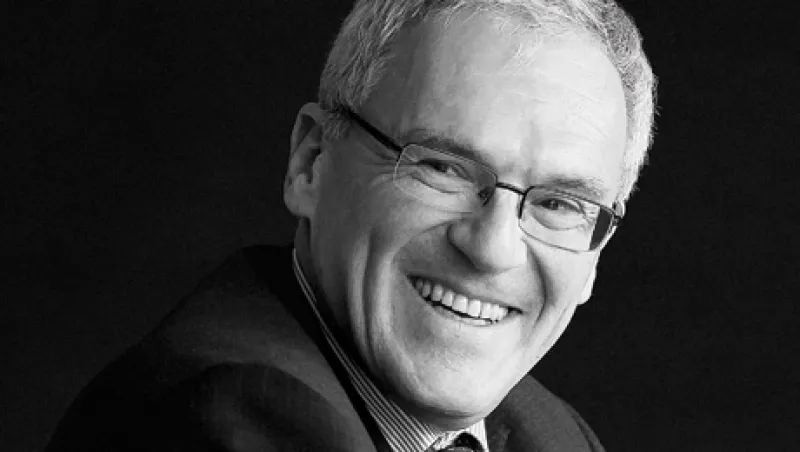There’s nothing hip about Vivendi CEO Jean-Bernard Lévy. The elegant and seemingly unflappable Frenchman is a serious classical pianist whose parents sent him to boarding school in England to learn the language there.
But Lévy, 57, ably rules an empire that makes much of its coin from delivering entertainment to young, digitally savvy consumers. Paris-based Vivendi owns Universal Music Group — the planet’s largest music company — and 60 percent of Activision Blizzard, the California publisher of the bestselling Call of Duty and World of Warcraft video game franchises. Among the conglomerate’s other assets: French telecommunications company SFR and pay-television provider Canal+ Group, Brazilian telecom operator GVT and a 53 percent stake in Rabat, Morocco–based Maroc Telecom.
Since taking over from interim CEO Jean-René Fourtou in 2005, Lévy has built up Vivendi’s core businesses; now he wants them to collaborate more closely. But the former aerospace executive has warned of weak earnings this year and next because of such factors as fierce competition in the domestic and Moroccan mobile markets.
Lévy’s overall track record at Vivendi is impressive. He inherited huge debt thanks to a zealous overexpansion by Fourtou’s predecessor Jean-Marie Messier, who had recast the onetime water, waste and construction giant as a media company. Lévy streamlined Vivendi after Messier’s buying spree, selling its minority stake in NBC Universal to General Electric Co. But among other changes, he added growth stories by merging Vivendi Games with Activision in 2008 and acquiring GVT the following year. In 2011, Activision Blizzard’s revenue hit an all-time high of $4.75 billion; GVT’s earnings before interest, taxes, depreciation and amortization climbed 43 percent. Meanwhile, Vivendi’s adjusted net income rose 9.4 percent on revenue of €28.8 billion ($36.1 billion), to a record €2.95 billion, versus a €23.3 billion loss for 2002, when Lévy arrived as COO.
Lately, though, the Paris native must feel like he’s leading a Call of Duty campaign. Vivendi, whose 58,300 employees make it Europe’s biggest telecom and entertainment group, is under fire from shareholders. On May 25, Vivendi stock closed at €13.10, down 23 percent for 2012. Shareholders blame the holding company structure and say Vivendi should sell assets. Lévy has been busy simplifying things, partly through a major acquisition. Last year Vivendi paid €7.95 billion for London-based Vodafone Group’s 44 percent stake in SFR. But SFR’s margins have since been hammered by French discounter Free Mobile’s cheaper packages.
In his defense Lévy can point to growth in Brazil and other emerging markets, which accounted for almost 20 percent of Vivendi’s revenue last year. Now that music publishers have figured out how to profit through digital channels, there’s also renewed optimism at Universal Music. And as consumers buy more of their music and movies online, Vivendi’s options include stronger ties among Universal, Canal+ and its telecom properties.
Known as the toughest of negotiators, Lévy earned degrees in engineering and telecommunications from the École Polytechnique and Télécom ParisTech before working as an engineer at France Telecom until 1986. That year he joined the French civil service as a technical adviser to Gérard Longuet, minister for Postal and Telecommunications Services. From 1988 to 1993, Lévy was general manager of communications satellites at Toulouse-based Matra Marconi Space. He then briefly rejoined the government as Longuet’s chief of staff before becoming chairman and CEO of successor aeronautics and defense company Matra Communication. In 1998 he moved to Paris investment banking and capital management firm Oddo & Cie, where he rose to CEO.
Senior Writer Julie Segal talked to Lévy at the Hotel Sofitel in New York during last month’s French elections. Besides asking whether Segal’s 11-year-old daughter should be listening to Universal artist Lady Gaga, the father of four discussed changes in the music industry, Vivendi’s growth prospects and his strategic view of video game production.
Institutional Investor: In the French elections that just passed, Socialist François Hollande defeated Nicolas Sarkozy. The world is closely watching Europe, especially Greece. What will change for the European Union under Hollande?
Lévy: The situation with the euro and Greece is not going to change because there is a new French president. The wording of any agreement may change, but it’s not going to be fundamentally different. It will take ten or 15 years for the Greeks to have a more sound economy. And the question is, are they going to be able to bear these constraints, or are they going to exit the euro zone, which at the end of the day nobody cares too much about because [Greece is] only a small part of the euro zone’s GDP.
Vivendi owns a portfolio of very different businesses. How do they fit together?
It’s quite simple. All we do is provide services to the digitally connected consumer. We don’t provide equipment; we don’t manufacture iPads or computers or headsets. We don’t create technology. But our future is tied up with the demand for sophisticated services that can be interactive, that can be broadcast, that can be accessed by hundreds of millions of people all around the world.
In the past ten years, the music industry’s revenues have been cut in half. Why are you optimistic about the future?
Because we’re at a turning point when you look at the numbers. We are at a point where digitally distributed music is a very large part of total sales. It’s about half of what we sell in this country and about 30 percent globally. Digital distribution looks like it is offsetting the permanent decline that is still going on in physical sales.
What’s driving that trend?
Consumers finally understand the investment behind the music and behind the talent, and they are willing to pay. They are now used to paying for digitally distributed music, which is split into two major areas, one being music that you pay to own and the other being music that you subscribe to, where you can listen in an unlimited way to millions of songs.
You’ve been promoting many of the digital services that are now popular. Tell me about that.
We’ve tried a lot, even if some of the ventures that we went into over the past ten years have not been successful. And some of them are now working, like Spotify. As they become successful, we get the benefit of the investments we’ve made. We were very active in helping Steve Jobs and his team create iTunes and make it a pleasant, fun experience for music lovers.
Talk about Universal’s bigger strategy and how to profit in a digital world.
As you said, the market has declined by 50 percent, but we’ve been profitable each and every year. We’ve been quite active in terms of mergers and acquisitions, adding to our catalogue and hiring good people. What is crucial to our success is to think globally. For 50 years the music industry catered to less than 1 billion people on the planet: the U.S., Canada, Europe and a few others. We now have to work for 7 billion people, so we really need to think globally.
How will selling music in these new geographies be so different?
You cannot think about physical records in countries where people have never bought a physical record. You need to create new channels to put music in front of people. You have to partner with people who already have the right channels into the public. We work with telcos in the Middle East, Asia and South America, including GVT in Brazil.
How have new French taxes hit Vivendi?
Last year we paid about €250 million more in taxes than we had planned. Still, we had record-breaking numbers thanks to the acquisition of SFR and the good performance of every business inside Vivendi. This year we have to pay about €600 million more than planned, some of it income tax and some of it revenue-based taxes. So our plans have been dramatically changed by our contribution.
What will you do to counter that?
We have to find growth areas. We do have some. The largest one is in Brazil, but we also have good growth prospects for most of our businesses. The French-based business is a bit more difficult because the profit can be eaten up by the extra taxes we pay. We’re finding growth in Asia; we’re finding growth in Brazil, in Africa.
You recently took over the day-to-day management of SFR as it faces tough competition. What’s the strategy?
We are France’s second-largest telco and the only one that is competing with the state-controlled operator [France Telecom–Orange] in every area of the telco business. So we have a whole range of products and services, and the strategy is to keep and grow that position of being the only true challenger to the incumbent. We’ve grown this company, which was created 35 years ago, to make it the largest alternative telco in Europe.
How do you deal with the price pressure?
By cutting our costs.
Is that the only way to do it?
Well, do you have a better one? Seriously, we have so-called transformation workshops with our employees. We have to redefine the business model to serve the various segments of the markets that are changing. We have low-cost technology, which is now becoming a bigger part of the business. We have to adjust to the reality of the market. It’s going to be painful. There are going to be layoffs, obviously.
What’s happening in the gaming world?
We have a very successful line of business called Skylanders that is targeted to six- and seven-year-olds. And then the game industry is addressing male and female teenagers, young adults and grown-ups. Some of our top brands have become hits all over the world. Social media like Facebook are forcing other changes as well. People now have the ability to play video games in all kinds of places with a cell phone, tablet or other device, through their home or their mobile connection. And many people play casual games, which can be accessed for free or for very little. So the market has been growing but also splitting. We are developing sophisticated games, which require a large investment and where people will pay a significant amount for a very extensive and comprehensive experience.
Which means you have to expand?
Which means we have to invest. We spend a lot of money for only a few games. We’re not trying to launch a game a month; we are trying to launch a few very successful games every year, based on some of our key franchises, like World of Warcraft or Diablo or StarCraft or Skylanders.
Vivendi is under pressure from shareholders. Why does the conglomerate structure still make sense to you, and what do you want to do with it?
We are unhappy with the stock price, and we’re doing all we can to improve it. A lot of it has to do with the businesses we operate and the countries in which we operate. I’m not searching for an excuse, but the telco business, especially in Europe, is leading to very low multiples. Over the past ten years, the company has been amazingly transformed. Even in the past three or four years, we’ve been making some key asset allocation decisions: allocating more money to emerging markets like Brazil, for instance, and getting rid of minority positions that were not very meaningful for us. • •







